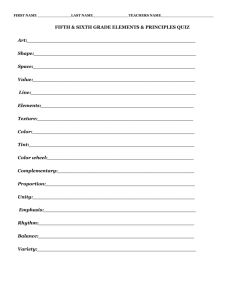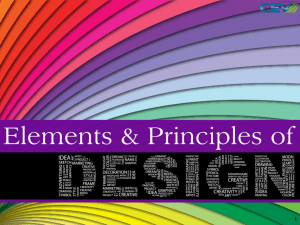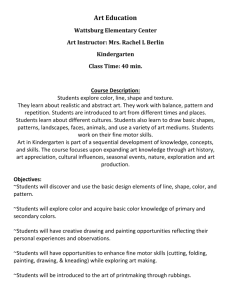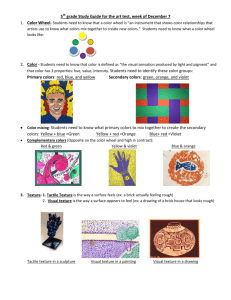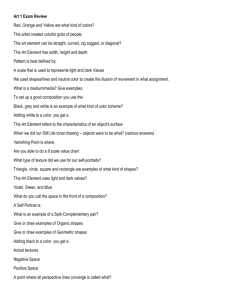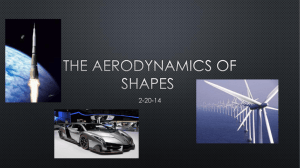exam review - Plain Local Schools
advertisement
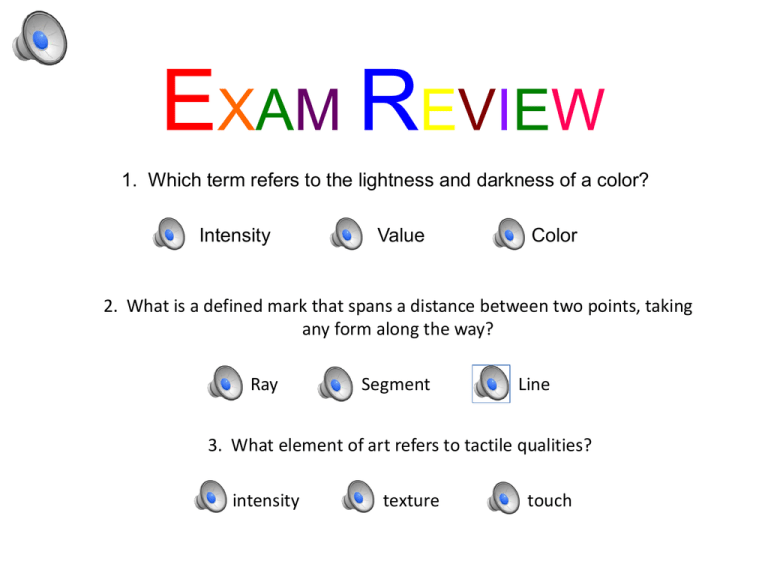
EXAM REVIEW 1. Which term refers to the lightness and darkness of a color? Intensity Value Color 2. What is a defined mark that spans a distance between two points, taking any form along the way? Ray Segment Line 3. What element of art refers to tactile qualities? intensity texture touch 4. This term refers to the relationship between objects with respect to size, number, and so on? Scale Duplicate Height 5. This element of art could be geometric or organic? Size Shape Line 6. Which term refers to the brightness or dullness of a color ? tint darkness intensity 7. Why shouldn’t you automatically use black to darken a color? Black fades over time It tends to dull or murky colors The texture of the paint will change Black doesn’t occur in nature 8. Rough is an example of what art element? intensity texture touch 9. Artists arrange their work with the principles of design . Which of these is not a principle of design? rhythm pattern balance 10. Which two colors create Green? red and blue yellow and red orange and green blue and yellow 11. Tinting is when you add black to a color? True False color 12. The illusion of a three-dimensional world on a two-dimensional surface is called? perspective magnitude proportion 13. What are the outer edges or “outline” of a perceived shape called? contour line outline thumbnail sketch 14. Black and white are primary colors? True False 15. The space surrounding and between an object is _______________? positive space negative space 16. Adding white to a color creates a _____________? hue dye tint 17. Rhythm can create a sense of movement to the eye? True False 18. What two color combinations create the color Violet (Purple)? yellow and green blue and red red and yellow blue and green 19. __________ refers to the distances or areas around, between or within an object. It can be positive or negative – sometimes two or three dimensional? space distance area 20. Geometric shapes are precise and sharply defined? True False 21. Which of the following is another work for “center of interest”? focal point emphasis dominance all of the above 22. Another word for brightness of a color is ____________? intensity value hue 23. Rhythm may be alternating, regular, flowing, progressive, or jazzy? True False 24. What two color combinations create the color Orange? yellow and green blue and red red and yellow blue and green 25. What is the art element that refers to the sense of touch? value pattern texture 26. Forms are three dimensional. They have height, width, length, depth and thickness. True False 27. The range of lightness and darkness within a picture is? shade contrast value tint circle cone 28. Which of these is not a form? cylinder sphere 29. Organic forms have precise lines and are sharply defined? True False 30. Contrast can be created by using? Smooth and rough textures Plain areas against areas of pattern Large and small shapes All of the above 31. Artists use this principle of design to make the most important part show up first? perspective main idea contrast focal point 32. It is impossible to create the illusion of space on a 2 dimensional surface? True False 33. Pick the best answer to describe SHAPE? An element that refers to the area between, around and/or within things. A principle of design that deals with height and width An element that is concerned with depth; and that encloses space. An element of art that is concerned with length and width, and that encloses space. 34. Useful art is called? functional expressive narrative decorative 35. You can not see through an object or material that is transparent? True False 36. What are colors opposite one another on the color wheel called? monochromatic warm tones triadic complementary 37. Visual ____________ is achieved when all parts of composition appear to have equal weight. It appears steady and stable. balance unity harmony symmetry 38. Forms are three dimensional geometric figure. They have height, width, length, depth and thickness? True False 39. Name the three primary colors?___________, ___________, __________. yellow, orange, green red, yellow, violet blue, red, yellow 40. Colors that make a triangle on the color wheel? analogous complementary triadic warm colors 41. Colors that give you the feeling of “fire and heat”? cool tones colors secondary colors warm tones primary 42. All one colors (tints, tones, and shades) of a single hue. hue undertone value monochromatic 43. Name three secondary colors ____________, _____________, ____________? red, yellow, orange orange, green, voilet blue, orange, voilet 44. Colors that are adjacent or next to one another on the color wheel? complementary analogous hue primary colors 45. _____________ in a work is obtained by repeating colors and shapes – all parts of a design are working together as a team? unity peace harmony pattern 46. A type of balance in which both sides of a composition are balanced yet different? geometric symmetrical asymmetrical radial 47. Lines, colors, or shapes repeated over and over in a planned way is a _________? arrangement pattern diagram decoration 48. _____________ is clay that has not been fired. It is very fragile at this drying stage and should not be handled? kaolin leather hard greenware bisqueware 49. ___________ is the act of aligning the clay body on the potter’s wheel in order to form and shape the clay? coning centering spinning 50. __________ is a form for supporting inverted pottery for trimming or drying? bat foot rim chuck 51. __________ is a coating, applied to clay, which fuses and turns to glass when fired in a kiln under very high temperatures? raku mod podge slip trailing glaze 52. A _________ is a plaster, Masonite, plastic or dense fiberboard surface that can be attached to the wheel head? chuck bat foot rim 53. A ___________ is a large flat piece of clay formed by rolling your clay into one even thickness? pinch pot coil slab sgraffito 54. _________ is a handbuilding method of forming pottery by building up the walls with coils of rope-like rolls of clay? coiling centering coning spinning 55. A ___________ is a furnace or oven built of heat resistant materials for firing pottery or clay? pit kiln stove kennel 56. What kind of clay do we use in our classroom? stoneware ball clay fireclay earthenware 57. _________ is technique for attaching two clay pieces together, the surfaces to be joined are scratched, covered with slip and firmly pressed together? scoring monoprinting enameling underglaze 58. ___________ is considered a filler, and added to clay bodies for several reasons; it helps open a tight or dense body, promotes even drying, which reduces warping and cracking, and reduces overall shrinkage. It also adds tooth and texture to a clay body aiding in the ability of the body to maintain it’s form during construction? oxide iron oxide kaolin grog Thanks for playing and GOOD LUCK! on your assessments
